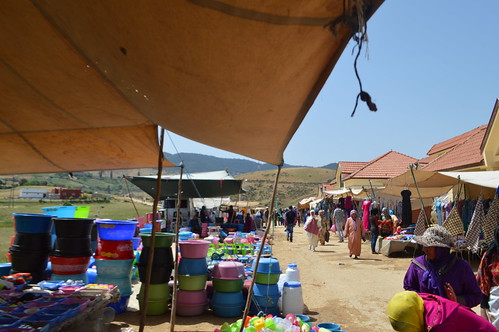While the rest of the country relaxes and enjoys the two days-in-a-row weekend, the weavers of the Cooperative of Ain Leuh are still on the run.
The weekend for the weavers is not on Saturdays and Sundays like the rest of the country, their weekend is divided between two days;Wednesdays and Fridays. The selection of the days is not random. Traditionally, Friday is the day when Muslims all over the Islamic world prefer not to work, they go to do the Djummuah (Friday) prayers and run their errands. The Weavers are not different, Friday is the day when they sleep in, attend their families, and cook their national dish the Kusksu.
Wednesday, the other weekend day for the weavers, is a different story. Even on the supposedly “day off”, the women do not totally distance themselves from their work at the cooperative.
Wednesday is the big market day in Ain Leuh. On this day, sellers from allover the region of Ifran gather together at the market place about 1.5 km from the village. If you imagine the village’s market to be an area with several knitly-made stands where only fruits and vegetables are sold, then this blog entry will be quite a surprise to you. Ain Leuh’s village market resembles our large shopping malls with their various stores and products rather than the Western-style farmer market. On this weekly market there are several “restaurants”, farmers’ markets, stands that sell groceries, butchers, barbers, watch-makers, clothes, antiques and wool…I could go on. The market truly provides a wide array of products, keeping shoppers entertained and busy for hours. Merchants of similar goods spread their tents close to each other, providing the shopper with broader options while at the same time competing over customers.
People commute from near and far by feet, bus, and donkeys!! We chose the bus. Like the other shoppers, we ascended the shabby bus and paid a fare of 2 Dirham per person. The bus drove downhill on the unpaved and curvy road. Our weavers were among the passengers. Their trip to the market is not only to satisfy their household needs- groceries and goods but also to buy wool from wool traders in order to proceed the weaving of their carpets and blankets. Long time business relations between the weavers and their merchants have made them masters in negotiation, bargaining and in closing great deals. When they arrive at their business partners’ stand, they do not address business at once. They make jokes, chat, and exchange stories before getting down to their main purpose of thevisit.
Do not let the friendly chitchat fool you into thinking the ladies will shy away from stubbornly bargaining to reach the price they want to pay for their order of wool. Once the wool is chosen, cut, weighed, and packed the weavers fiercely start their bargaining process. As much as they love a good bargain, they will never compromise the quality of the wool they use in their products. It is a matter of principle for the Weavers’ Cooperative of Ain Leuh, that the quality of the wool is premium, even if that means paying higher prices and purchasing less.
Wool merchants are not only wool suppliers to the cooperative. They are also distributors and retailors of the cooperative’s finished goods into remote areas. The merchants who come to Ain Leuh’s weekly market are mobile merchants who carry their products to various villages that have their weekly markets on different days. This mobility enables them to diffuse and sell the finished carpets of Ain Leuh’s cooperative in other villages with a higher margin as their profit. Once these goods are sold, the merchants pay the cooperative and take new products to do the same procedures anew.
By noon the shopping is done and the bags are loaded, and it is time to go home and prepare lunch for the family. Busses are waiting, the full bags are thrown on the roof of the bus and squeezed we managed our way among the overcrowded bus. As we reached out to the driver to pay the 2 Dirham ride fare he smilingly declined and demanded 3 Dirham instead. He explained difference in price between the two ways as follows: on the way to the market the bus is traveling downhill “almost empty” and gas is not needed, on the way back however, the bus is overloaded climbing up hill the whole way. Thus, 1 Dirham Extra!
Posted By Benan Grams
Posted Jul 3rd, 2013


